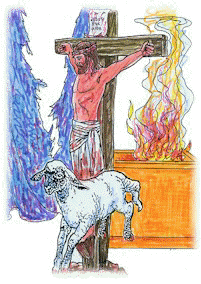Christ is the End of the Law (What does that mean?)

To the believer what does Christ become?
"For Christ is the end of the law for righteousness to everyone that believeth." Rom. 10:4.
In what sense is the word end (Greek, telos) sometimes used in the Scriptures? Object, intention, or design.
"Ye have heard of the patience of Job, and have seen the end of the Lord." James 5:11.
What was the object of the law?
"And the commandment, which was ordained to life, I found to be unto death." Rom. 7:10.
What further is the end, or object, of the law?
"Now the end of the commandment is charity out of a pure heart." 1 Tim. 1:5.
What is charity, or love?
"Love worketh no ill to his neighbor; therefore love is the fulfilling of the law." Rom. 13:10 (1 John 5:3).
Why did God send His Son to the world?
"For what the law could not do, in that it was weak through the flesh, God sending His own Son in the likeness of sinful flesh, and for sin, condemned sin in the flesh: that the righteousness of the law might be fulfilled in us." Rom. 8:3, 4.
Then what is one enabled to do through Christ?
"That the requirement of the law might be fulfilled in us." Rom. 8:4 (see margin of Revised Version).
NOTE: Since obedience "unto life" is the "end of the law," and Christ is the means by which one is justified and enabled to keep the law, it is thus that He becomes the "end" or object, of the law for us.
"The end of the law was to bring men to perfect obedience, and so to obtain justification. This is now become impossible, by reason of the power of sin, and the corruption of nature; but Christ is the end of the law; the law is not destroyed, nor the intention of the Lawgiver frustrated; but full satisfaction being made by the death of Christ for our breach of the law, the end, or objective is attained -- which is justification and obedience. Christ is thus the end of the law for righteousness, for justification; but it is only to every one that believeth." --Matthew Henry
What positive statement does the apostle make concerning the law?
"Therefore by the deeds of the law there shall no flesh be justified in His sight." Rom. 3:20.
What does the law do?
"I had not known sin, but by the law; for I had not known lust, except the law had said, Thou shalt not covet. Rom. 7:7 (Rom. 3:20, last clause).
Will the law do this work for others besides the Jews?
"Now we know that what things soever. the law saith, it saith to them who are under the law, that every mouth may be stopped, and all the world may become guilty before God." Rom. 3:19.
What is the nature of God's law?
"Wherefore the law is holy, and the commandment holy, and just, and good." Rom. 7:12.
It is manifest that a law, the office of which is to point out sin, can never justify one from the transgressions of that law. How, then, can man be justified?
"Being justified freely by His grace through the redemption that is in Christ Jesus." Rom. 3:24.
But does the fact that we are subjects of God's grace, give us license to sin?
"What then? shall we sin, because we are not under the law, but under grace? God forbid. Know ye not, that to whom ye yield yourselves servants to obey, his servants ye are to whom ye obey, whether of sin unto death, or of obedience unto righteousness?" Rom. 6:15, 16.
How must those walk who would be free from condemnation?
"There is therefore now no condemnation to them which are in Christ Jesus, who walk not after the flesh, but after the Spirit." Rom. 8:1.
1John 2:3-6
And hereby we do know that we know Him, if we keep His commandments.
He that saith, I know Him, and keepeth not His commandments, is a liar, and the truth is not in him.
But whoso keepeth His Word, in him verily is the love of God perfected: hereby know we that we are in Him.
He that saith he abideth in Him ought himself also so to walk, even as He walked.






<< Home